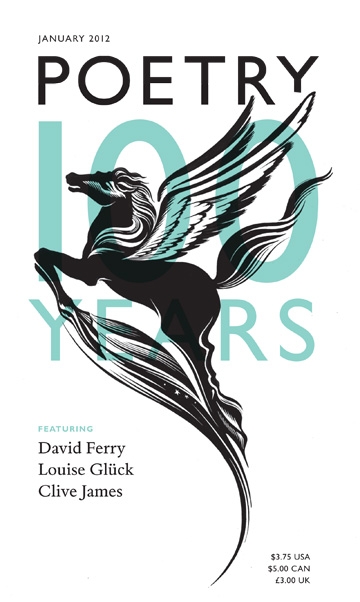A Hundred Years of Pegasus

I purchased a copy of the January issue of Poetry magazine at Barnes & Noble in Union Station in Washington, D.C., recently. The veteran print magazine, founded in Chicago in 1912 by Harriet Monroe and published monthly by the Poetry Foundation, is celebrating its centennial. Check out the magazine website here.
The image of Pegasus on the cover of the January issue, a long elegant flowing graphic of the mythical Greek flying horse, done by artist Cathie Bleck, is one of a dozen representations of Pegasus done by different artists that will appear on the cover of the magazine throughout the centennial period of 2012. It compares favorably to a cartoonish representation of the horse that appears flying above the partying literati in a photograph of a 1947 Poetry magazine gathering.

In addition to poetry by two of my favorite poets, Stephen Dunn and Louise Glück (pronounced "Glick"), the January issue contains works by Eratosphere member A. E. Stallings, Joseph Spece, Michelle Boisseau, David Ferry, Amy Beeder, Michael Ryan, Stephen Edgar, and Kathryn Starbuck.
As a poet and a historian, I find fascinating the article on the magazine's early years by V. Penelope Pelizzon, "Potsherds & Arrowheads." It is to the credit of Ms. Pelizzon and the Editors in the opening note to the issue that they recognize that Poetry's content over its history has not been all peaches and cream, that there were numerous "lowlights" as well as highlights. In fact, Ms. Pelizzon admits that it is hard to find the quality poetry among the dreck that was published in those early decades -- that the pieces by such better poets as Vachel Lindsay, Carl Sandburg, or (*gulp*) Ezra Pound stand out starkly, as do contributions from the likes of Louise Bogan, Langston Hughes, and Weldon Kees in the 1930's. It's quite an admission for the essayist and the Editors to make: to admit that the contents of the magazine has been so-so over the many decades of its history. It also says something about the personal tastes of magazine editors in any era.
The other literary-historical essay that I like in the issue is the review article by Adam Kirsch on two volumes of T.S. Eliot's early letters edited by his second wife and collaborators. Kirsch's commentary, entitled "Infallible Pope of Letters," is a good, meaty article, salvaging the great man's reputation somewhat, opening by explaining how Eliot saved his literary soul by remaining in England rather than returning to the stifling confines of the United States as his stuffy New England/St. Louis family requested that he do. Although, seeing as Eliot died in January 1965, it's disappointing to see the typo in the title of the first volume of letters, dating the collection to "1989-1922", Volume 2 being "1923-1925." In fact, the first date should be 1898 not 1989. At a whopping $45.00 a pop for each of these volumes, the canny purchaser might wish to buy these books cut-price somewhere. Good luck!





Total Comments 0




















